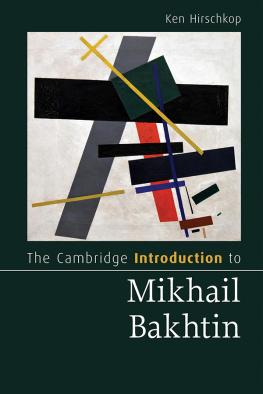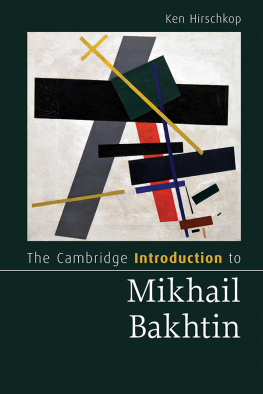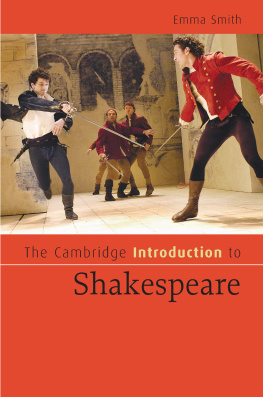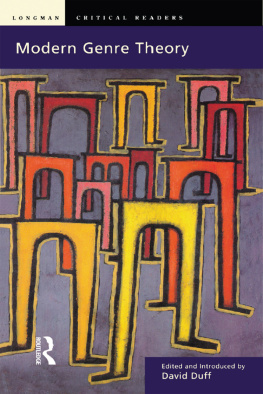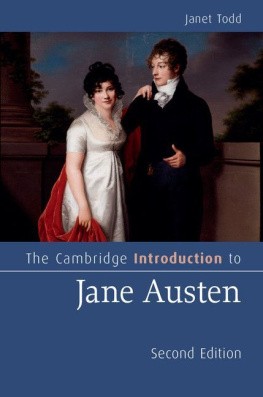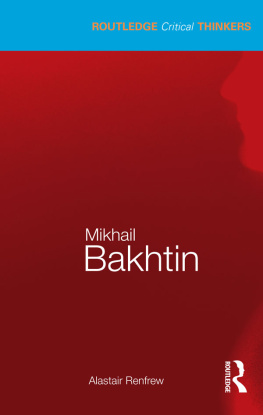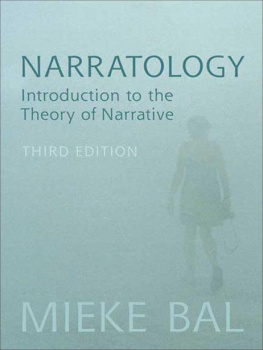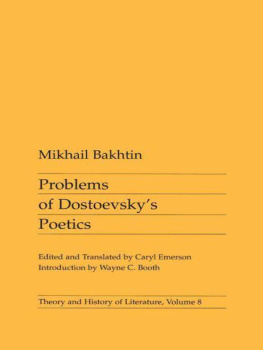In this introduction to Mikhail Bakhtin, Ken Hirschkop presents a compact, readable, detailed, and sophisticated exposition of all of Bakhtins important works. Using the most up-to-date sources and the new, scholarly editions of Bakhtins texts, Hirschkop explains Bakhtins influential ideas, demonstrates their relevance and usefulness for literary and cultural analysis, and sets them in their historical context. In clear and concise language, Hirschkop shows how Bakhtins ideas have changed the way we understand language and literary texts. Authoritative and accessible, this Cambridge Introduction is the most comprehensive and reliable account of Bakhtin and his work yet available.
Ken Hirschkop is Professor of English Language and Literature at the University of Waterloo. A recognised international authority on Bakhtins work, he has co-edited Bakhtin and Cultural Theory (1989, 2005) with David Shepherd, written Mikhail Bakhtin: An Aesthetic for Democracy (1999), and contributed articles on Bakhtin to many leading journals.
University Printing House, Cambridge CB2 8BS, United Kingdom
One Liberty Plaza, 20th Floor, New York, NY 10006, USA
477 Williamstown Road, Port Melbourne, VIC 3207, Australia
314321, 3rd Floor, Plot 3, Splendor Forum, Jasola District Centre, New Delhi 110025, India
103 Penang Road, #0506/07, Visioncrest Commercial, Singapore 238467
Cambridge University Press is part of the University of Cambridge.
It furthers the Universitys mission by disseminating knowledge in the pursuit of education, learning, and research at the highest international levels of excellence.
www.cambridge.org
Information on this title: www.cambridge.org/9781107109049
DOI: 10.1017/9781316266236
Ken Hirschkop 2021
This publication is in copyright. Subject to statutory exception and to the provisions of relevant collective licensing agreements, no reproduction of any part may take place without the written permission of Cambridge University Press.
First published 2021
Printed in the United Kingdom by TJ Books Limited, Padstow Cornwall
A catalogue record for this publication is available from the British Library.
Library of Congress Cataloging-in-Publication Data
Names: Hirschkop, Ken, author.
Title: The Cambridge introduction to Mikhail Bakhtin / Ken Hirschkop.
Description: Cambridge, United Kingdom ; New York, NY : Cambridge University Press, 2021. | Series: Cambridge introductions to literature | Includes bibliographical references and index.
Identifiers: LCCN 2020055433 (print) | LCCN 2020055434 (ebook) | ISBN 9781107109049 (hardback) | ISBN 9781107521094 (paperback) | ISBN 9781316266236 (epub)
Subjects: LCSH: Bakhtin, M. M. (Mikhail Mikhalovich), 1895-1975Criticism and interpretation.
Classification: LCC PG2947.B3 H56 2021 (print) | LCC PG2947.B3 (ebook) | DDC 801/.95092dc23
LC record available at https://lccn.loc.gov/2020055433
LC ebook record available at https://lccn.loc.gov/2020055434
ISBN 978-1-107-10904-9 Hardback
ISBN 978-1-107-52109-4 Paperback
Cambridge University Press has no responsibility for the persistence or accuracy of URLs for external or third-party internet websites referred to in this publication and does not guarantee that any content on such websites is, or will remain, accurate or appropriate.
Acknowledgements
This may be the last book I write on Bakhtin; part of me certainly hopes so. That being the case, its worth looking back on the circumstances and people that led me to this point. Two of those people could not possibly have known the seeds they were sowing. There was the popular high school teacher of Russian, whose possible sacking led me to sign up for instruction in a language I had no interest in at the time (I was persuaded to do so by my friends, who were interested in Russian, and, being me, I never got round to switching out). There was my high school friend, Klemens Meyer, who lent me his copy of Problems of Dostoevskys Poetics when I was taking an evening course on the Novel and the City and needed some help with Crime and Punishment. That such small gestures could shape a career is evidence of the role that serendipity may play in our lives.
Once I got going, however, the help was explicit and generous. There was a masters thesis on Bakhtin in London under Jane Graysons selfless and careful supervision and a doctoral one supervised by the tireless, and always interested Terry Eagleton. There was, importantly, a world of Bakhtin scholars, who met periodically to talk and share, and who created a scholarly community that was varied, open, stimulating, and quite a lot of fun to belong to. Among those who should get credit for this community because communities, even enjoyable ones, take work are Clive Thomson, who organised the first International Bakhtin Colloquium and edited the six still invaluable issues of the Bakhtin Newsletter , and David Shepherd, who once the dam broke in the Soviet Union organised numerous visits of Russian Bakhtin scholars to the UK and established the Bakhtin Centre at the University of Sheffield.
The generosity and open-mindedness that distinguish the community of Bakhtin scholarship have been a joy to behold. Readers of this book may know that literary studies in North America and Europe are often the scene of passionate and somewhat acrimonious dispute, despite the relatively low stakes: the rise of politically orientated and motivated criticism and theory has led to some strikingly heated arguments in the detailed work of literary scholarship. In Russia and the Soviet Union, the stakes were, in the immediate sense, much, much higher: after all, in the past people had been murdered by the Soviet state for having the wrong view on literary matters (Bakhtins friend Pavel Medvedev was one such victim). Bakhtin scholars, in Russia and elsewhere, are a heterogeneous group, straddling the various divides that structure twentieth- and twenty-first-century literary scholarship. They not only follow different methods and have divergent literary interests, but they are devoted, in their larger intellectual lives, to very different causes, some political, some religious, some philosophical. They have, however, not let these differences get in the way of their scholarly endeavours: I have shared ideas with, been supported by, and had important conversations with Bakhtin scholars whose general worldview could not have been more different from my own, at home and in Russia. While I have my own strong political views and a deep sense of the intersection between political life and literary scholarship, this is complemented by an abiding conviction in the importance of open, critical, and independent scholarship, led by the facts and the most compelling arguments. Ive been privileged to be part of a scholarly community organised around the same convictions. This book, which stands on the foundation of the work of many scholars, of all different sorts, is a testament to that community.
Within that community, there are a few people whose work on and on behalf of Bakhtin has proved fundamental and on which I have relied heavily. The late Michael Holquist was warm and encouraging throughout our acquaintance, and his advocacy for Bakhtin, tireless work as an editor and translator, and infectious enthusiasm got Bakhtin scholarship moving in the English-speaking world. Caryl Emerson has generated a stream of insightful, thoughtful commentary and has given us what is, in my view, the best existing English-language translation of any Bakhtin work (her readable, but precise Problems of Dostoevskys Poetics ). The late Sergei Bocharov was one of the men who rediscovered Bakhtin and who lovingly aided and guided him in his last fifteen years, but after Bakhtins death he may have done him an even greater service. His editorship of the Academy of Sciences Collected Works was an extraordinary achievement, establishing the foundation for all work on Bakhtin in the future. The late Iurii Medvedev and his wife, Daria, were tireless, sophisticated, and persuasive advocates for the work of Iuriis father, Pavel Medvedev, and their hard work debunked much of the mythology surrounding Bakhtin and made available Medvedevs fascinating oeuvre . The late Nikolai Pankov edited a Bakhtin journal, Dialog Karnaval Khronotop , that revolutionised the field and produced detailed philological and biographical studies that have no equal in Bakhtin scholarship. Craig Brandist has done more to elucidate the intellectual history of Bakhtins work than any other writer, and his detailed, sophisticated studies have illuminated the entire landscape of Bakhtins work. Galin Tihanov has produced a series of brilliant and original analyses of Bakhtin, which have changed the way we understand and appreciate his work.

